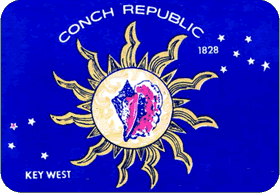
The recent headlines about the FALN have reminded us presumptuous Yanks that not everyone in Puerto Rico is thrilled at the prospect of the island becoming the 51st U.S. state or even remaining a territory. But that should not be news to anyone, and the sentiment doesn't limit itself to territories. The Civil War notwithstanding, many individuals have tried in recent years to yank their states' star right off that flag. Within our borders, there's an uncountable number of micronations (in fact, declaring your independence has become a geek hobby). Here are a few U.S. secession movements of recent years:
Republic of Texas. Probably the best known of the modern state secession movements. Claims that Texas is already a republic and not part of the United States. It bases its declaration of Texan sovereignty on the fact that when the Civil War was over and Congress allowed former Confederate states (including Texas which, technically, was not a Confederate state but an independent nation allied with the Confederacy) to rejoin the Union, there was never a successful vote by Texas citizens to do so. In 1870, a special federal law was passed allowing Texas representation in Congress, but, the spokespeople of the Republic claim, this is merely a fraud used to convince everyone that Texas is part of the U.S. In true Texan style, though, there's more that one "official" Republic of Texas organization.
The Conch Republic. In 1982, the US Border Patrol established a military roadblock on the Overseas Highway leading out of Key West, Florida to search all northbound traffic for drugs and illegal aliens. Mayor Dennis Wardlow and five Key West businessmen seceeded from the Union and established the Conch Republic, declared war on the U.S., immediately surrendered and applied for foreign aid. The Border Patrol discontinued the roadblock, but the government has yet to cough up any foreign aid. To this day, Key West celebrates the declaration of the Conch Republic with a yearly festival.
Alaskan Independence Party. Founded in 1978 by Joe Volger, this party seeks a vote by the Alaskan populace on secession vs. statehood. The party claims that Alaska's original vote on joining the Union was corrupt and did not offer citizens a proper choice between statehood, commonwealth status, and independence. They oppose Federal environmental protection of Alaskan land and, not surprisingly, support the right to keep and arm bears.
Free the Bear. Promotes the "peaceful secession" of California and its establishment as an independent republic. Like most good secession movements, it's politically conservative and opposed to "violent, socialist, and racists [sic] movement among a group of latino/chicano [sic] activists." Gee, kinda makes you wonder, doesn't it? In general terms, the idea of California leaving the Union has an excellent chance of success, but only if the rest of the country gets to vote.
Kingdom of Hawaii and Sovereign Nation of Hawaii. The movement in favor of Hawaiian sovereignty, either as a kingdom or a republic, is largely one driven by the native peoples. In 1993, Congress issued Joint Resolution 19, signed by Clinton, apologizing for the 1893 overthrow of the Kingdom of Hawaii. It's been argued by supporters of Hawaiian independence that the resolution forms a legal basis for the secession of Hawaii and the reestablishment of Hawaiian sovereignty.
See also: Demanding IndependenceThomas S. Roche is a GettingIt staff writer.
